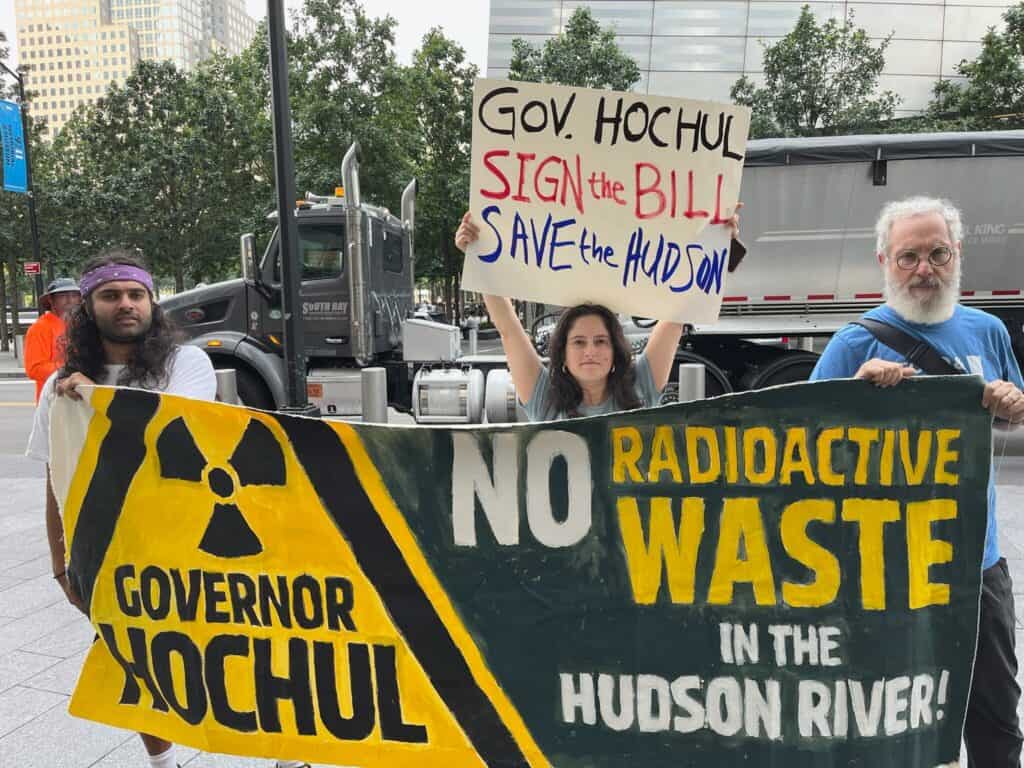
Seven of Westchester’s eight Assembly members sent a joint letter to Governor Hochul on Tuesday, urging her to sign Assembly Bill 7208 as soon as possible. A.7208 (Levenberg), known colloquially as the “Save the Hudson” bill, would prohibit radioactive wastewater discharges into the Hudson River in connection with the decommissioning of a nuclear power plant. A bipartisan group of elected officials from more than 30 municipalities on both sides of the river have passed resolutions in support of the legislation, and both A.7208 and the Senate version of the bill, S.6893 (Harckham), had bipartisan support in their chambers. The Assembly passed the bill 101-44, and the Senate passed it unanimously.
The letter comes after months of advocacy by leading environmental groups, and follows previous letters to the Governor from sponsors and co-sponsors of the legislation. The issue has gained new urgency following a July 31 public forum hosted by the Decommissioning Oversight Board, during which members of the public learned for the first time that the Nuclear Regulatory Commission (NRC) would permit Holtec to discharge its wastewater without waiting for all of the results of the required testing to be returned.
“Specifically, results for strontium-90 take longer to receive than the results for other contaminants,” the members write, referring to information shared by a Department of Health representative at the meeting who indicated that strontium-90 results would take around three months to come back. Approximately 90 minutes into the public forum, a questioner asked if testing had already begun, given Holtec’s stated intention to begin discharging the water as early as mid-September. Representatives from the regulatory agencies confirmed that it had not, and that Holtec may still be permitted to discharge its wastewater without waiting for those results.
“Strontium-90 is readily absorbed into the tissues of plants and animals due to its similarity to calcium. It is particularly dangerous for growing children, and is believed to induce bone cancer and leukemia. The idea that Holtec would be permitted to discharge its wastewater into the river before levels of such a contaminant can be verified is alarming,” the letter continues. “Decisions such as this contribute to mistrust, not just of Holtec, but of the state and federal agencies that are tasked with monitoring them and ensuring our safety.”
“How can the public trust the federal regulators who tell us that these discharges are safe if we will not have confirmation of what is actually in the wastewater until after it is released?” asked Assemblywoman Dana Levenberg, lead sponsor of the bill. “Our testing protocols should put safety first. Fining violators after the damage is already done does not protect the public from potential harm. I get more questions about the progress of this legislation than any other,” Levenberg continued. “People are very anxious about this issue. We need Governor Hochul to reassure our communities that decommissioning will proceed in a safe way.”
Assembly members Gary Pretlow (D-Mount Vernon), Amy Paulin (D-Scarsdale), Steve Otis (D-Rye), Nader Sayegh (D-Yonkers), Chris Burdick (D-Bedford), and MaryJane Shimsky (D-Dobbs Ferry) joined Levenberg in sending the letter.
Assembly Member Amy Paulin said: “For decades the Hudson River was heavily polluted as factories along the river dumped garbage and industrial waste into its waters. It has taken decades of remediation work, all at the cost to taxpayers, and the steadfast activism of Westchester’s residents, to turn the Hudson around and back into a healthy river. We need more analysis of all of the possible options of dealing with the treated wastewater from Indian Point.”
Assembly Member Steve Otis said: “We have a long history of depending upon assurances that practices are safe, only to later have them determined to be unacceptable. New York should set the example that the issue of releasing radioactive material into water bodies as part of the decommissioning process needs more intense scrutiny, review, analysis, and caution. It would be wise and prudent for New York to prohibit these discharges now and require storage until better options are presented or developed as the science of what to do with these materials improves.”
Assembly Member Nader Sayegh said: “Our historic Hudson River waterfronts have enjoyed a rebirth helping to grow the region’s economy by creating jobs and new housing. Allowing over a million gallons of radiological waste water to be discharged into the river is completely unacceptable.”
Assembly Member Chris Burdick said: “The release of radioactive wastewater into the Hudson River is unconscionable and must be stopped. It is detrimental to our health, our water quality, and our environment. The threat is dire and imminent, and I urge the Governor to sign the bill promptly.”
Assemblymember MaryJane Shimsky said: “My office has heard from more constituents on the issue of Holtec’s planned discharge of tritiated water into the Hudson River than on any other issue — the vast majority of them opposed to such a reckless step. Among other concerns, this maneuver by Holtec will threaten the economic redevelopment of our Hudson River waterfronts.”
“I hope that Governor Hochul will take immediate action to protect our Hudson Valley communities, as Massachusetts Governor Maura Healey has done for Cape Cod,” added Levenberg, referring to the Healey administration’s recent move to block Holtec from discharging one million gallons of wastewater from the decommissioned Pilgrim nuclear power plant into Cape Cod Bay.





